Martha Frintzila

Born and raised in Eleusis, director, actress, and singer Martha Frintzila has studied and worked on a wide range of theatre and music-related projects.
Since 1993, Frintzila has collaborated as an actress with the National Theatre of Greece, as well as municipal and private theatre companies in the fields of ancient drama, contemporary, and musical theatre. Since 1996, she has worked in the capacity of director with a number of institutions, including the National Theatre of Greece, the Athens & Epidaurus Festival, the National and Kapodistrian University of Athens, the Athens School of Fine Arts, the Neos Kosmos Theatre, the Poreia Theatre, the Chora Theatre, the Music Village at Agios Lavrentios, the Brooklyn Academy of Music (BMA), the Princeton University, and the Stockton University in New Jersey.
She is a founding member and director of the Dromos me Dentra theatre company. Since 2001, the company has presented several theatrical productions in Greece and abroad, as well as experimental theatrical and music events in collaboration with noted artists and institutions. In 2010, the company set up Baumstrasse / Dromos me Dentra, a fully equipped space of art and education. The Dromos me Dentra company has assisted the Municipality of Eleusis in setting up the Attiko School of Ancient Greek Drama, active and run, since 2013, by Frintzila.
Frintzila is also a recording artist and has performed as a singer in concerts and festivals in Greece and abroad. As of 2002, she teaches classes of traditional song performance. Her research interests include musical teaching and chorus coordination in ancient Greek drama.
Workshop: “Boxing the body of the chorus”
The subject matter
The workshop consists of voice and body exercises, intensive training and readings, all of which aim to build the body of the chorus.
What is the chorus?
Why are crowds at a football match so perfectly synchronized when it comes to expressing excitement at a “good move”? And then again, what is the element that makes the crowd react with such collective disappointment in the face of a “bad move”? How do they get to express such a concerted response, be it approval or disapproval? Who gets to decide the moment of collective waving or booing? Who gives the signal? Who is the first one to cheer or boo? The answer is: nobody.
Likewise, in ancient Greek drama, the chorus does not function on a cumulative basis. The chorus is not the cumulative result of individual actions. Rather, it functions as the absolute synchronized result per se, imposing perfect coordination and uniformity, both in terms of expression and in terms of voice/sound.
The chorus serves as a new hero who holds his own and faces the rest of the heroes on equal terms. The actors/members of the chorus do not function as individual, separate organs of an organism. Instead, the chorus constitutes a complete organ in itself, which, in turn, forms part of the organism known as Tragedy. Being an organism, it needs to be healthy and balanced in order to survive; this effect can be achieved only if its various constituent parts work together in harmony. The chorus comes to replenish the missing and non-functional parts, thus serving as the ultimate balancing organ.
The method
The method adopted in this seven-day workshop is based on Plato’s tripartite division of the human soul into the rational, the spirited, and the appetitive, a distinction which has also been applied to the community and the republic. One can similarly apply this distinction to the chorus, dividing it accordingly into the cognitive, the emotional, and the instinctive chorus. The actors/members of the chorus are required to investigate this important distinction and physically embody it.
The cognitive chorus – The head: The mind, the observer, the eye and ear. The mental aspect, thought and reason. Wisely keeping and maintaining a distance from the action, the cognitive chorus passes judgment and consults. It represents the community, the congress of wise men who give advice – in vain. The chorus as a philosopher: Helen, Antigone, Oedipus, Agamemnon, Medea.
The emotional chorus – The chest: Spirit, emotional involvement, ideology, virtue, wrath, strength, defence. The guardians: The Trojan Women, Ajax, Ion, Hecuba, The Suppliants.
The instinctive chorus – The pelvis: Libido, lust, hunger, violence, uncontrollable passions, irresistible desire: The Bacchae.





